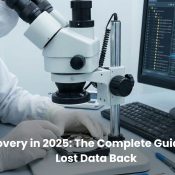Data expert helping trace data crime
Data expert helping trace data crime
Data expert helping trace data crime
On many occasions during tense court proceedings for a Data Crime Related case, George Njoroge, the CEO of East Africa Data Handlers, has felt like punching the air in exasperation as he listened to his lawyer go off-script. In some of those instances, he has ended up losing data litigations he should have won with ease.
He had lost enough suits by the time he decided to enrol for a law degree at the University of Nairobi two years ago. His vision was not to become a lawyer.
“I would be very clear about the assignment at hand, but I just could not articulate the brief to the lawyer in proper legal terms. I needed a grasp of the law to be able to instruct my legal team better.”
Wearing a smile with as much swank as his blue tuxedo, he tells me that helping people and businesses to mitigate different issues through data has been the biggest fulfilment of his life. But his experiences have also been an opportunity to “understand our naivety about the complexities of data.”
That he is in the right place at the right time could not be truer. Fifteen years ago, he set up East Africa Data Handlers, the only such business in Kenya. For 10 years, the firm built a reputation for helping clients recover lost data.
Now the business has expanded to six markets in Africa. But the scene is different. He tells me the data recovery segment of the business is no longer viable. “Few people lose their data anymore. Recovering lost data constitutes only about 20 percent of our work or less.”
Instead, there is an almost infinite and untapped mine in forensics work “which is the future for data professionals.”
Forensics is exciting, lucrative but a dangerous territory with clientele spanning powerful people, corporations, and State agencies.
To get a feel of his world, George is hesitant to do this interview in either of his two labs in the city where more than 100 data engineers and analysts, forensics technicians, and reconstruction experts work.
“This work is sensitive. Essentially, we break into computers to extract vital digital information for use as evidence in court.” The last thing he wants in his labs is prying eyes, I gather.
On the day of this interview, I run into him in the lift, with a visibly agitated client in tow. From their body language, it is obvious something is off-tangent.
“Data theft or manipulation often means loss of business or reputation,” he explains about the frantic conversation with the client.
Many of those who come to see him are in this distraught state. But it is his effortless calm in the face of routine tempests that is admirable about this executive. EADH is betting on two things to grow in this relatively new market; Anton Piller and ransomware decryption.
“In Anton Piller, data experts search a suspect’s premises, including their computers, to seize evidence needed to prosecute a case.” In this principle, no prior notice is given.
The company has applied this principle in disputes involving corporations, including one between a leading telco and an associate, and during mergers and acquisitions where skulduggery often thrives.
“We’ve used Anton Piller to investigate claims of insider trading during a merger between two companies in the energy sector,” he recounts.
George acknowledges that obtaining evidence this way is often a slippery process, owing to the legal landmines involved. “The product of an [illegal process] is illegality. The first thing you do is to legalise the process by getting a court order from a judge by presenting what you believe is evidence.”
It is for the same reason that the business runs with exclusivity and, sometimes, secrecy.
Three years ago, George had toyed with the idea of listing his company. Today, he is glad he held back.
“Many of the companies who did at the time haven’t gained as much value as the owners had anticipated. Our stock market hasn’t done well in recent years. Privately held companies have dinner better.”
George does admit, though, that he is an introverted and introspective professional who believes that “things move faster when I act alone.”
A father of four, he says he wants his children to have a different outlook on education.
“I want them to appreciate how differently things are done elsewhere and that they can replicate it here by choosing whatever career paths they want.”
New-age crime
Nothing excites George quite like the applicability of technology to mitigate issues such as new-age crime.
Ransomware is his favorite.
“Today, criminals will hack into a company computer and encrypt their data (putting a password) and then demand a ransom,” he explains.
For businesses, encryption of their data, usually collected for years, is unthinkable. “It’s this data they use to draw insights that inform their business decisions.”
As such, many will pay any amount of money to have access to their data “which the hackers have no use for.”
George says the way of life has made the modern human more vulnerable to data malpractices, mostly because “we’re behavioural and instinctive.”
Passwords offer little protection for personal data. This is true for individuals and companies.
“In most cases, the IT manager keeps the password for the company’s computers. Sometimes the password is his girlfriend’s name. You only need to get this detail and all the data is yours to access.”
This vulnerability will only grow worse in the future. To him, it is up to people to change what details they keep on their phones, for instance. “We’ve our lives compressed in our phones from wallets to personal pictures, certificates, and other documents. This makes us vulnerable.”
Then there are the deep fakes, which run wide and against which no one is safe. Personalities have fallen victim to the use of footage, images, and audio from different contexts combined to create a narrative that either embarrasses them or hurts their brand.
“The complexity of telling the difference between what’s authentic and what’s fake is very high today,” George says, revealing that he is currently working on “one of the biggest cases locally” where the data of a business has been compromised.
He has a name for it: corporate thuggery. “It’s becoming an area of focus for us as a business. We’re constantly working to prove that certain things [about our clients] didn’t happen.”
On the future of data litigation, George insists that the judge, prosecutor, and lawyer of the future will have to be tech-savvy.
“I see a possibility where to study law one will be required to have an undergraduate degree in the various disciplines in technology.” His indulgence With nearly 20 timepieces, buying collector watches is George’s way of rewarding himself. He tells me that investing money in property has never appealed to him. If he could, he would invest his wealth in crypto currency, a possibility he has considered since 2015. “When I learnt about it, one Bitcoin cost $2,000 (Sh220,000). Today, the coin costs $50,000 (Sh5.5 million).” Why then didn’t he invest when he had a chance and could afford it?
“At one point, the crypto market crashed. I was also not sure whether it was the right time to invest. At the time, and even today, I still haven’t figured out how crypto currencies work.”
A General Election is coming in under seven months, and once again, data on voters is priceless in the development of campaign messaging. It is also a period that is awash with data manipulation, misinformation, and malice. George’s take is straightforward and blunt.
“The battle will be won digitally. You can’t wish away the power of technology to influence and shape the opinions and actions of people.”
If hiring a data expert is an expensive undertaking for many businesses, setting up a data department is nearly inconceivable. How has he managed to hire such a large team of highly sought-after professionals?
George argues that his focus has always been to attract and retain talent. “We’ve been around for 15 years. This has allowed us to develop the right talent and skills.”
Companies, he says, cannot continue to hold back investment in data.
“The future of business is in data-driven decision making. It’s in innovation. No CEO can afford to make decisions on a whim anymore. A must-have in many businesses today is an accountant. The must-have in companies of the future will be data analysts.”
Full Interview Courtesy of: Business Daily Africa.
https://www.businessdailyafrica.com/bd/lifestyle/profiles/data-expert-helping-trace-crime-3688706
Looking For Data Digital Forensics Experts in Kenya And Africa”
Talks to out Data Experts:
Contact
+254 722 435 163 or +254 711 051 000.
WhatsApp Us On https://wa.me/254722435163
All Categories
- Backup
- BUSINESS EMAIL COMPROMISE ATTACKS
- Cloud back up services in Kenya
- Cloud Computing
- Computer Forensics
- Cyber Attacks
- Data Loss
- Data Recovery
- Data Recovery Contacts
- Data Recovery Cost
- Data Recovery In Mombasa
- Data recovery in Nairobi
- Data recovery in South Sudan
- Data recovery in Uganda
- Data Recovery Kenya
- Data Recovery Rwanda
- Data RecoveryKenya
- Database Recovery
- Design
- Desktop Recovery
- DIGITAL FORENSIC LABORATORY(DFL)
- Digital Forensics
- Digital Forensics Kenya
- Digital Photo Data Recovery
- Email Data recovery
- Hacking
- hardriver Recovery
- Laptop Data recovery
- Mobile Data recovery
- Network and Security Services
- Phone Data Recovery
- Raid Data recovery
- Raid Recovery In Kenya
- Ransomware
- Ransomware Attacks
- Ransomware Removal Services
- Server Recovery
- Services
- Technology
- Uncategorized
- Virtual PBX Cloud Services
- Virus & Malwares




